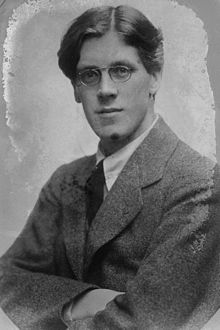Fenner Brockway
| The Lord Brockway | |
|---|---|

Portrait of A. Fenner Brockway, circa 1910–1915.
|
|
| General Secretary of the Independent Labour Party | |
|
In office 1933–1939 |
|
| Preceded by | John Paton |
| Succeeded by | John McNair |
| Chairman of the Independent Labour Party | |
|
In office 1931–1933 |
|
| Preceded by | James Maxton |
| Succeeded by | James Maxton |
| Member of Parliament for Eton and Slough |
|
|
In office 23 February 1950 – 15 October 1964 |
|
| Preceded by | Benn Levy |
| Succeeded by | Anthony Meyer |
| Member of Parliament for East Leyton |
|
|
In office 30 May 1929 – 27 October 1931 |
|
| Preceded by | Ernest Edward Alexander |
| Succeeded by | Frederick Mills |
| Personal details | |
| Born |
Archibald Fenner Brockway 1 November 1888 Calcutta, British India |
| Died | 28 April 1988 (aged 99) |
| Political party | Independent Labour Party |
| Other political affiliations |
Labour Party |
Archibald Fenner Brockway, Baron Brockway (1 November 1888 – 28 April 1988), was a British anti-war activist and politician.
Brockway was born to W. G. Brockway and Frances Elizabeth Abbey in Calcutta, British India. While attending the School for the Sons of Missionaries, then in Blackheath, London (now Eltham College) from 1897 to 1905 he developed an interest in politics. Around 1908 Brockway became a vegetarian.
After leaving school he worked as a journalist for newspapers and journals including The Quiver, the Daily News and the Christian Commonwealth. In 1907, Brockway joined the Independent Labour Party (ILP) and was a regular visitor to the Fabian Society. He was appointed editor of the Labour Leader (the newspaper of the ILP, later called the New Leader) and was, by 1913 a committed pacifist. He opposed British involvement in the First World War and, through his position as editor of the Labour Leader, was outspoken in his views about the conflict. On 12 November 1914 he published an appeal for men of military age to join him in forming the No-Conscription Fellowship to campaign against the possibility of the government attempting to introduce conscription in Britain. The offices of the Labour Leader were raided in August 1915 and Brockway was charged with publishing seditious material. He pleaded not guilty and was acquitted in court. In 1916 Brockway was again arrested, this time for distributing anti-conscription leaflets. He was fined, and after refusing to pay the fine, was sent to Pentonville Prison for two months.
...
Wikipedia
